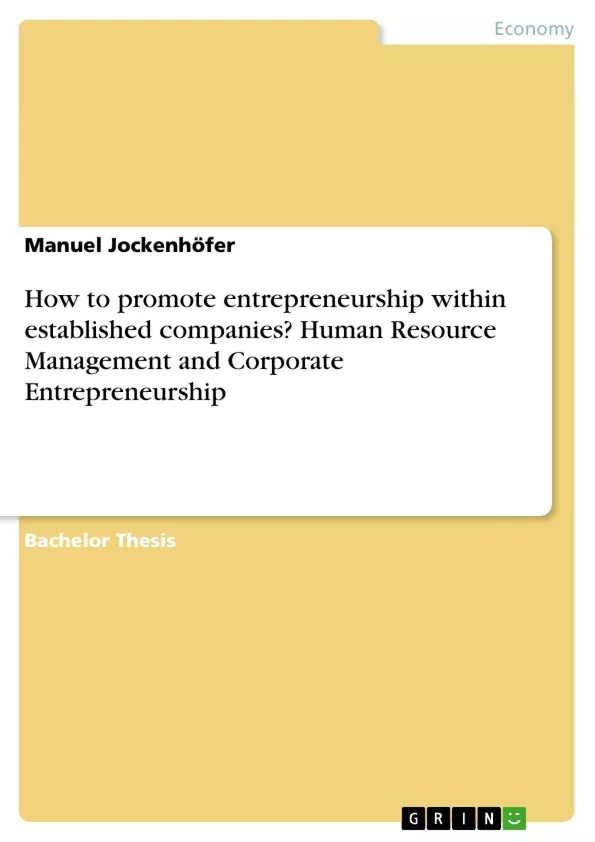Introduction
There is a growing consensus that companies should promote entrepreneurship within their organizational boundaries. This way, established companies are in a position to preserve and reinforce the innovativeness and flexibility from which many young enterprises benefit. The business strategy pursued by organizations which intentionally engage in various entrepreneurial activities is referred to as a corporate entrepreneurship (CE) strategy. The CE strategy implies the continuous development of new products and technologies as well as the flexible adjustment of internal organizational structures and processes. Thus, the pursuance of a CE strategy generally helps those organizations acting in dynamic business environments to enhance their competitiveness and economic viability. Given that today’s business environments are increasingly characterized by “rapid technological evolution, glob- alization, and progressively sophisticated competitors” (Schmelter et al., 2010, p. 716), the CE strategy is recommendable for more and more companies. Nonetheless, although researchers paid increased attention to the field of CE over the last three decades, still little is known about how organizations can consciously stimulate and promote their entrepreneurial activities. Assuming that the activities conducted by organizations are substantially determined by their individual members, the more concrete question arises of how an organization can strengthen the entrepreneurial mindset and behavior of its employees. Therefore, the final aim of this thesis is to examine how human resource management (HRM) can effectively support the implementation of a CE strategy. In the course of this, the beneficial employee characteristics and behaviors for CE will be identified, the compatible HRM practices will be determined, and the mediating roles of both organizational culture and leadership between HRM and an effective realization of a CE strategy will be analyzed. The research question will be answered with the help of a theoretical approach and the results from expert interviews.
Inhaltsverzeichnis (Table of Contents)
- Introduction
- Theoretical Fundamentals
- Corporate Entrepreneurship
- Human Resource Management
- Human Resource Management and Corporate Entrepreneurship
- Beneficial Employee Characteristics and Behaviors
- Compatible Human Resource Management Practices
- Organizational Culture and Leadership as Mediators
- Expert Interviews
- Method
- Results
- Conclusion
Zielsetzung und Themenschwerpunkte (Objectives and Key Themes)
This Bachelor's thesis investigates the role of human resource management in corporate entrepreneurship. The main objective is to explore the relationship between specific human resource management practices and the success of corporate entrepreneurship initiatives. The research aims to identify key employee characteristics, HRM practices, and organizational factors that contribute to the promotion of corporate entrepreneurship. * Key employee characteristics and behaviors beneficial for corporate entrepreneurship * Compatible human resource management practices that foster a culture of innovation and entrepreneurship * The role of organizational culture and leadership as mediators in the relationship between HRM practices and corporate entrepreneurship outcomes * Expert insights from interviews with practitioners in the field of corporate entrepreneurshipZusammenfassung der Kapitel (Chapter Summaries)
The introduction provides background information on the importance of corporate entrepreneurship and the role of human resource management in fostering innovation. Chapter 2 delves into the theoretical foundations of corporate entrepreneurship and human resource management, outlining key definitions and concepts. Chapter 3 explores the link between HRM practices and corporate entrepreneurship, examining beneficial employee characteristics and behaviors, compatible HRM practices, and the mediating role of organizational culture and leadership. Chapter 4 presents the findings of expert interviews conducted to gain insights from practitioners in the field.Schlüsselwörter (Keywords)
This research focuses on the relationship between human resource management and corporate entrepreneurship, exploring key employee characteristics, compatible HRM practices, organizational culture, and leadership as critical factors in promoting innovation and entrepreneurial activity within organizations.Frequently Asked Questions
What is Corporate Entrepreneurship (CE)?
CE refers to a business strategy where established companies intentionally engage in entrepreneurial activities to preserve innovativeness and flexibility within their boundaries.
How can Human Resource Management (HRM) support a CE strategy?
HRM can support CE by identifying beneficial employee characteristics, implementing compatible practices like incentive systems, and fostering an entrepreneurial mindset.
Which employee behaviors are most beneficial for corporate innovation?
Proactivity, risk-taking, and a high level of creativity are key traits that HRM seeks to strengthen to ensure the success of corporate entrepreneurial initiatives.
What role do culture and leadership play in Corporate Entrepreneurship?
Organizational culture and leadership act as mediators; they translate HRM practices into an environment where employees feel empowered to act entrepreneurially.
Why is CE more important in today's business environment?
The increasing pace of technological evolution, globalization, and sophisticated competitors force companies to adapt quickly to remain economically viable.
- Citar trabajo
- Manuel Jockenhöfer (Autor), 2012, How to promote entrepreneurship within established companies? Human Resource Management and Corporate Entrepreneurship, Múnich, GRIN Verlag, https://www.grin.com/document/197684



